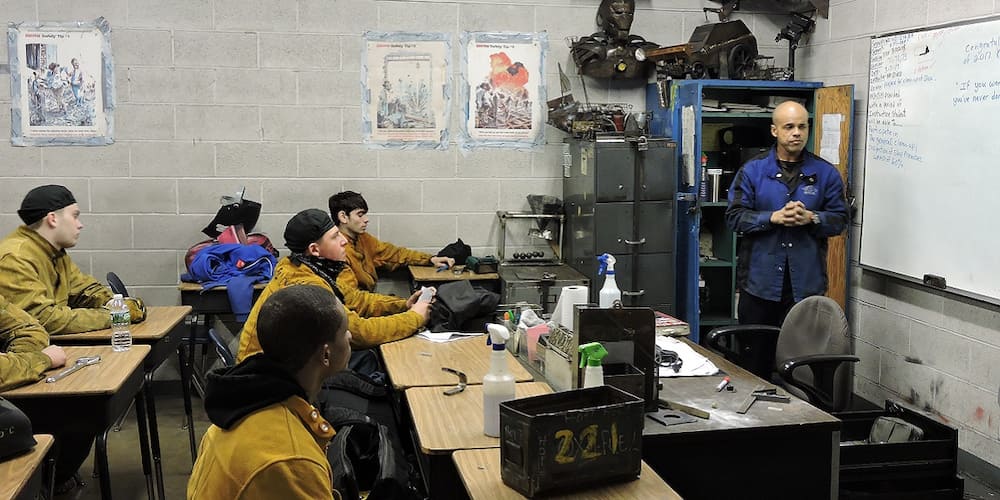
A trade school (also known as a technical school) is a postsecondary educational institution designed to train students for a specific job in a skilled trade career. Most importantly, a trade school provides practical instruction to prepare students for real-world employment in their chosen field. Programs at trade schools are wholly focused on practical job training.
For instance, a potential welder might not have ever welded before. Where can one go to get welding instruction? Students can practice in a lab that is designed to prepare them for the workplace, which is offered by a trade school.
Keep reading.
Table of Contents
Trade School Definition
A trade school is any post-secondary educational institution that offers training for a specific job. To acquire the skills necessary for their chosen career path, such as welding, business administration, or computer repair, students enroll in a trade school program. Trade schools put a lot of effort into helping students get ready as quickly as possible for the workforce in a skilled trade.
What Are Trade Schools, And How Do They Operate?
A trade school is centered on the industry students are preparing to work in, unlike traditional 4-year liberal studies universities that require classes and electives in subjects students may never apply to their career. In order to prepare students for work in their trade, they gain practical experience.
Typically lasting between 8 months and 2 years, trade school is shorter than traditional colleges. Some trade school courses, like the computer numerical control (CNC) machinist training program at Universal Technical Institute (UTI), can be finished in as little as 36 weeks.
At A Trade School, What Do You Learn?
That depends on the profession you are learning. You can learn the skills necessary to become an entry-level automotive technician, for instance, in auto mechanic school. In-person lectures, online instruction, and practical lab work with actual tools may all be used in the same class. Students enroll in classes like Vehicle Brake Systems, Automotive Climate Control Systems & Repair, and Automotive Engines Service & Repair.
You can learn how to become a beginning welder in welding school. A variety of welding methods, including GMAW, GTAW, SMAW, oxy-fuel, and FCAW welding, are taught in this kind of trade school.
You can anticipate being prepared for an entry-level career in your chosen trade at any type of trade school you enroll in, from a dental hygienist trade school to a marine mechanic school. A technical school’s curriculum should be compared to your career objectives.
The Difference Between Trade School, Technical School And Vocational School
You’ll probably hear the terms technical school and vocational school mentioned quite frequently when researching any kind of trade school. How do they differ from trade schools, though, and what do they actually mean? Here’s a quick breakdown:
- Trade School: Simply put, trade schools are secondary institutions that provide instruction in skilled trades. They frequently concentrate on physically demanding careers that call for a fundamental certification or a predetermined number of on-the-job hours.
- Technical School: An institution that provides the associate’s degrees and specific certifications required to enter technical job fields is referred to as a “tech school.” Trade schools typically provide more hands-on training, whereas tech schools frequently use traditional classroom lectures and job training. They might provide a broader education in some circumstances, with an emphasis on skills specific to a given profession. But there may be differences between schools.
- Vocational School: ‘The phrase “vocational school” is frequently used as a catch-all phrase to refer to both technical and trade schools. Vocational degrees are made to give students the skills they need to start working in their chosen field right away or within a few years.
These three words are frequently used interchangeably. The distinctions and how the programs stack up against one another can be useful information to have, though, when making a choice.
Trade School Types: What Can You Learn And How Do They Operate?
All trade schools provide highly specialized training programs geared toward a particular field. Different training programs may be provided by a single trade school, such as training in HVAC as well as welding. A technical school may offer both programs, though they are both distinct programs. The training facilities and classrooms for both programs may be located on the same campus in this instance, but each program has its own qualified instructors and pertinent coursework.
Some trade schools offer numerous variations of training in a single field and are highly specialized. For instance, an automotive technical school might provide various programs with various specializations and be centered around auto mechanics.
Benefits Of Attending A Trade School Over A Four-year College
There are some undeniable advantages to attending a vocational school.
The most obvious benefit of going to a trade school is that trade schools require less time to complete. It is possible to complete almost all trade school programs in less time than two years. A traditional four-year college degree typically takes at least four years to complete, and many students need a fifth or sixth year to finish. In contrast, earning a degree from a community college typically takes two years, and both of these degrees can be earned online.
You can gain more work experience and advance in your career more quickly with less time spent in school. You won’t have to pay for those extra years of college tuition if you aren’t in school, and you might need fewer student loans.
Another advantage of trade schools is the hands-on preparation you’ll receive for a specific job. Many four-year colleges and their programs place a greater emphasis on academic study than on preparing students for the workforce. If you majored in philosophy or theater and graduate, for instance, you might find it challenging to land a job that is directly related to your field of study. Learning the skills you’ll need for your job after graduating is the main focus at a trade school.
Similar to this, it might be simpler to find a job in the beginning if you attend a vocational school where the objective is to learn the skills necessary for a specific job. Additionally, a lot of trade school programs are targeted at industries with a high need for workers.
Additionally, there are lucrative jobs you can get with a trade school degree. The median salary for dental hygienists in 2020 was $77,090, according to the Bureau of Labor Statistics. The median starting salary for graduates from four-year colleges in the class of 2020 was $55,260.
Finally, if you go to a trade school, you don’t have to stress about the traditional college application process. If you decide to attend a trade school, you won’t have to spend the time or money necessary for four-year college applications because the requirements are much less stringent there. You won’t be required to take the SAT or ACT. You won’t need to worry about your grades. There will be no need for you to worry about joining clubs solely to improve your college applications.
See more about
Disadvantages Of Attending A Trade School
While there are some advantages to vocational schools, there are also many disadvantages, particularly when compared to conventional 4-year colleges.
Even though there are financial benefits to going to a trade school, college graduates, on average, make more money than trade school grads. Depending on the field of study, the salary after attending American Career College in Los Angeles, which is the median income for students receiving federal financial aid ten years after graduation, ranges from $16,663 to $43,426. In contrast, UCLA’s salary increases from $18,498 to $110,878 after graduation. The typical UCLA graduate will still be financially well off even after taking into account the additional time spent in school.
Also, four-year colleges tend to offer more generous financial aid. The average tuition at West Coast University in Anaheim, California, is $39,100 after financial aid. CSU Long Beach, a campus of the California State University, charges an average of $9,622 for an in-state student.
Furthermore, if you go to a vocational school, you’ll miss out on the traditional college experience. There isn’t much social interaction and no real campus culture at trade schools. At a four-year university, you can live in dorms with your classmates, participate in clubs, go to campus events, watch sports, and join Greek life. Many people credit their time in college with creating wonderful memories and fostering lifelong friendships.
At a traditional college, you learn a lot outside of the classroom. You can go to lectures given by well-known academics and politicians and socialize with other students from around the world while doing so.
In a trade school, your education primarily consists of the job preparation you receive in the classroom.
Additionally, traditional colleges offer a more broad, well-rounded education. Once more, at a trade school, your education is almost entirely geared toward getting you ready for a particular job. In a traditional college, general education requirements will expose you to a wide range of subjects, and even in many majors, you will learn about a wide range of topics.
I majored in American Studies in college, an interdisciplinary field that focuses on the United States. I had the opportunity to enroll in degree-credit courses in sociology, education, religion, history, psychology, and political science. I was able to take classes in a variety of subjects outside of my major, including human biology, anthropology, statistics, and Spanish.
Traditional colleges take pride in teaching you critical thinking skills and forming you into an informed citizen who will be able to have a positive impact on society outside of your field of study in addition to preparing you for a specific job.
Finally, there’s more job flexibility with a traditional college degree. Regardless of your major, you can get a wide variety of jobs with a bachelor’s degree, whereas trade schools prepare you for very specific jobs.
Your program at a trade school will only train you to be a medical assistant if you study the subject. Your vocational school diploma won’t mean much if you ultimately decide that you want to pursue something else or if you have trouble finding employment as a medical assistant.
On the other hand, you have a lot more job options if you have a degree from a four-year university. Four-year college graduates from a range of majors can find employment in sales, education, and consulting. A four-year college degree also allows you to pursue graduate school and professional schools like law school and medical school. You’ll typically earn more money and have greater job security if you have more education and advanced degrees.

How Much Time Is Spent In Trade School?
The duration of the program at a trade school will vary. Trade schools typically last between 8 months and 2 years for a given subject.
Some trade schools, such as UTI, offer GED assistance to students who don’t yet have a high school diploma or GED in order to help them obtain their GED so they can apply.
What Careers Can Trade Schools Help You Get Ready For?
With the completion of a trade school program, you have a huge range of career options. Some examples of trade school careers include:
- Automotive or motorcycle technician
- Baker
- Bartender
- Chef
- CNC machinist
- Collision repairer
- Construction worker
- Dental hygienist
- Diesel technician
- Electrician
- Fitness or yoga instructor
- Florist
- Graphic designer
- Hairdresser
- Hotel or restaurant manager
- Licensed vocational nurse
- Locksmith
- Makeup artist
- Marine mechanic
- Masseuse
- Paralegal
- Plumber
- Technology specialist
- Welder
How Much Does Trade School Cost?
The costs associated with various trade schools and training programs will vary depending on the program, location, and specialty. For instance, a mechanical trades program at MTI that can be finished in less than a year, such as the Journeyman Welder Program or the HVAC/R–MAR Technician Program, may cost (on average) between $13,000 and $14,000. This is a little less than the national average for private trade schools in 2016–17, which was $15,135 for tuition alone.[1]
Programs at trade schools are typically much less expensive than four-year college degrees. For instance, the average annual tuition at a public four-year university was $9,970 in the academic years 2017–2018. A four-year degree could run you at least $40,000 in total costs, not counting books, supplies, or housing. Even more money is spent on tuition alone at a private four-year university, which is $34,740 annually.[2]
For assistance with defraying the initial training costs, the majority of trade schools provide some form of financial aid, including loans, grants, and scholarships. Along with the advantages of future earnings, the cost of attending a trade school should be taken into account. This includes the expected salary upon graduation, expected job growth in the field, anticipated number of years working, and potential future earnings with advanced specialization.
What Are A Trade School’s Benefits?
There are many benefits to selecting a trade school for your post-secondary education if you have an interest in a skilled trade. These include:
- Time: Compared to a four-year degree, trade school programs are typically much shorter. By selecting a trade school, you can finish your education and launch a professional career before you graduate from high school.
- Money: Trade schools typically cost less than 4-year universities because their programs are shorter. Plus, with financial aid available like scholarships and grants and employer-paid tuition reimbursement, you could get part or even all of your trade school paid for if you qualify.10
- Career assistance: UTI representatives are committed to assisting students in finding employment, so you gain more at trade schools like UTI than just the skills you need to succeed in an entry-level position. The level of career services dedication at a trade school like UTI is a major benefit to students, with skilled trades-focused career fairs, early employment assistance, and a large network of employers looking to hire UTI students.
- Focused education: A trade school does not require you to enroll in courses you find boring. Instead, you get to concentrate on the area in which you have an interest and wish to pursue a career. You might have to spend six months to two years at some traditional four-year colleges taking electives or courses in liberal studies that have nothing to do with your intended career path.
- Classroom experience: The classroom setting in a trade school mimics a real-world workplace because the education there is focused on a single subject. The tools and equipment that students will use after graduating are put through their paces. A supportive, real-world setting that goes beyond the typical college classroom allows students to practice, learn, and make mistakes.
- Network: The fact that all of your classmates share your enthusiasm for the subject matter you are studying is another awesome feature of trade school. This increases the networking opportunities for your career that you’ll find in trade school. In addition to helping you succeed in school, the shared experience can foster lifelong friendships.
Both high school graduates and adults looking to learn a skilled trade for a more rewarding career should consider trade schools. The majority of trade schools offer free virtual and in-person tours so you can determine whether the trade school environment is right for you.
A College Education: What About It?
Community colleges and private or public universities are two options for those who choose to pursue a college education.
In college, you typically finish general education courses in the first half of your program. Courses in science, math, history, and English could be included. These courses are intended to give you a broad education and the flexibility to choose your major as you progress through your program, even though they are unlikely to directly relate to your career.
While a bachelor’s degree typically takes four years to complete, an associate’s degree from a community college can be earned in about two years. Students have two options after graduating: either they choose to work in the field or continue their education through graduate programs. For experience in the field, many students complete internships either during or after their programs.
There are some significant differences between a trade school and a community college, despite the apparent similarities. Community colleges require you to take some prerequisite courses, like math and English, just like a traditional university does. Conversely, you can start studying for your chosen career path right away at trade schools.
So how can you tell if going to college is the right choice for you?
Everything depends on you and your objectives. College might be the best option, for instance, if you are interested in business but aren’t sure if you want to pursue a career in management, marketing, or accounting. You can enroll in a variety of business-related courses once you’ve decided to major in it to better understand what kind of work you want to do.
Today, many colleges offer online courses, giving parents and students who work great flexibility. Students can complete their coursework through these programs at times that work with their hectic schedules. However, more and more trade schools are starting to provide online learning options as well.
While traditional college is the best option for some people, it’s not for everyone, so it’s crucial to consider the potential advantages of a vocational school. Trade school might be the best option if you already know what you want to do for a living and are looking for a physically demanding career.
A Traditional Four-year University Vs. A Trade School: Which Is Better?
Answering this query is not possible. It depends on the individual and the career they want to pursue.
For some students, a two-year technical school may be preferable to a four-year university. At a four-year university, however, some people will do better. It all depends on what you want to study and the type of employment you want to pursue after graduation.
This means that everyone will have a different response to this question. Regardless of the kind of school you’re considering, it’s imperative to take some time to determine your professional goals and the steps that will help you get there before you decide where to enroll.
Why A Trade School Might Be The Right Choice For You?
Enrolling in a trade school could be the best decision for your future career if you are interested in learning a specific trade. However, if you’re still debating whether or not to attend trade school, look over this list of benefits to see if it might be right for you.
An Alternative To A Four-year College
Vocational schools offer training in specialized trade skills, typically without extensive general education classes but rather concentrated classes in the desired career. You get to use your hands to learn useful skills that you can apply right away in your entry-level workplace.
Possibility Of Financial Aid
Like many four-year colleges, you may be able to apply for financial aid if you are unable to pay the full cost of a vocational school. In order to receive financial aid, a trade school must be accredited and approved. If you’re eligible, this could relieve some of your financial worries and free you up to focus on your studies without worrying about money.
Bear in mind, however, that not everyone is eligible for this kind of assistance. Before enrolling, it’s crucial to get in touch with the trade school and find out more about their requirements. The school will walk you through the process to understand what forms and documents you will need to submit if you have any questions or need assistance.
No Need For A High GPA
If your GPA is low, it can be difficult to get accepted into many universities. However, for many of their programs, some vocational schools do not consider your high school GPA.
But that doesn’t guarantee that you’ll get into a trade school. They do have other requirements for enrollment, but if you had issues with your grades in high school or even college, this might be a great option to take into account. It’s a good idea to get in touch with the school and ask what they require first.
Might Be Able To Start Working Faster Than Traditional College Students
You might be able to enter the workforce earlier than other students who attend four-year colleges because you can complete many vocational schools more quickly than a traditional college. While it’s not always the case, it is conceivable.
Learn Other Practical Skills
You learn more than just job skills at a trade school. They also give you positive work habits, such as:
- Confidence
- Communication skills
- Self-discipline
- Specific skill-building
These abilities will help you succeed at work. A trade school tries its best to provide you with all the tools you’ll need to be successful in your chosen field of employment.
How To Apply To A Trade School?
For the majority of trade schools, the application process is relatively simple. The majority of schools offer a straightforward online application on their websites, or you can inquire about admissions directly with the school. Furthermore, application deadlines are not common. Although you can apply at any time, you might have to wait until the start of your desired program before enrolling.
Additionally, you might need to have an interview or speak with an admissions representative after submitting your application. These discussions are meant to inform you and direct you to the program that would work best for you.
Trade schools are generally open enrollment and are not regarded as selective. You are not required to take the SAT/ACT or to write an essay for the majority of schools and programs. Furthermore, trade schools won’t request recommendations from teachers or take into account your extracurricular activities when deciding whether to admit you.
Choosing A Trade School
The first step in selecting a trade school to attend is to choose a trade. Programs at trade schools are highly specialized, so prospective students must be certain of the career they want to pursue. After choosing a career path, prospective students can use a search tool, like the College Matchmaker provided by the College Board, or they can look for a trade school in their area by location. When selecting a school, The College Board advises students to take into account the price, academic requirements, and program format. Additionally, students should confirm that a school has a license or is accredited. Trade associations are a good place to start if you’re looking for a reputable school because they frequently provide lists of them.


